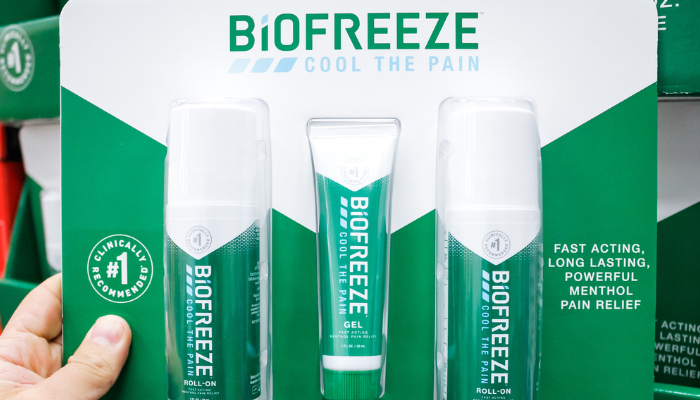It is safe to use Biofreeze and other pain relief gels with menthol while breastfeeding, as long as the baby’s mouth does not come into contact with the gel.
Avoid applying directly to your breasts or other areas that will be in direct contact with the baby, and wash your hands after application.
While large doses of peppermint-derived products like menthol have been linked to allergic reactions and vomiting, peppermint is generally recognized as safe by the FDA.
If applied to the nipples, it should be used after nursing, and the area should be thoroughly cleaned before the next nursing session.
However, according to the National Institute of Child Health and Human Development, “peppermint is also used to suppress milk production,” and the menthol is “excreted into breastmilk in small quantities.”
When only used occasionally, according to the directions, and in small quantities, Biofreeze should pose no harm to your nursing baby as long as it does not come into contact with their skin or mouth.
Table of Contents
Using Biofreeze While Breastfeeding
Biofreeze is a topical analgesic (pain-relieving) product for muscle and joint pain and comes in the form of a gel, spray, roll-on, or cream.
When applied to the skin, it creates a cooling sensation that can help temporarily relieve minor aches and pains by relaxing the nerves.
Breastfeeding keeps you in one position for several hours a day.
For me and many moms like me, creams like Biofreeze are a welcome remedy not just for sore breasts and nipples but also for our back, neck, and other muscle pains!
Proper Use of Biofreeze Topical Treatment
Biofreeze topical gels and creams can be applied to the affected area 3-4 times a day and no more.
Shake liquid forms of Biofreeze well before use, and rub the product in well.
Wash your hands thoroughly after application, and do not bandage the affected area as this may increase the risk of certain side effects.
Generally, you should stop using Biofreeze after 7 days. Consult your doctor if symptoms persist beyond this period.
In the case of accidental ingestion, Performance Health advises seeking immediate medical care or calling a poison center (1-800-222-1222).
Possible Side Effects of Biofreeze
Biofreeze should only be used as advised and in moderation, so be sure to discontinue use if you experience any of the following:
- Skin irritation: Redness, itching, or a burning sensation at the application site.
- Allergic reactions: In rare cases, allergic reactions to ingredients in Biofreeze can occur. Watch for rash, hives, swelling, or difficulty breathing.
- Excessive cooling sensation: The intense cooling effect created by menthol might cause discomfort or a feeling of excessive coldness, especially if applied in large amounts or on sensitive skin.
- Contact dermatitis: Excessive use of Biofreeze may lead to contact dermatitis (skin redness, dryness, or peeling).
- Eye irritation: Accidental contact of Biofreeze with the eyes may cause irritation. Avoid contact with the eyes, and wash hands thoroughly after application.
- Respiratory irritation: Inhaling the fumes or vapors of Biofreeze may lead to irritation of the respiratory tract in sensitive individuals.
If Biofreeze is used near the breasts, your baby might find the menthol odor off-putting.
Also, mint and products derived from mint are sometimes associated with a decreased milk supply in some women, so use these products sparingly.
Can You Use Biofreeze While Pregnant?
When used topically and in recommended amounts, menthol is typically considered safe for pregnant individuals.
However, everyone’s different, so it’s important that any product used during pregnancy is approved or recommended by your doctor.

When It Is NOT Appropriate To Use Biofreeze
You should not use Biofreeze if you have or suffer from:
- Broken or irritated skin
- Burns
- Deep wounds
- Skin sensitivities
- Previous allergic reactions to menthol-based products
- Circulatory diseases
- Nerve damage
Biofreeze is not recommended for use on infants or young children due to their sensitive skin.
Always discuss any new medicines or topical treatments with your doctor before taking them while breastfeeding.
The NHS advises, for example, that premature babies or infants born with jaundice may be affected by certain medications.
Biofreeze Effects on Milk Supply
As Biofreeze is applied topically (to the skin surface), the main ingredient, menthol, typically doesn’t enter the bloodstream in concerning enough amounts to affect your milk supply.
Menthol has been known to suppress milk production in mice and cell cultures, but more studies are needed on the possible effects on lactation in humans.
Safe Pain Medication While Breastfeeding
Pain is real and doesn’t magically stop occurring just because you are breastfeeding.
However, what you take to relieve your pain can affect your nursing baby. Knowing what is safe and what is not is critical.
For Headaches and General Pain
When looking for a pain reliever to relieve headaches or general pain, look for these ingredients that are safe for breastfeeding women:
- Acetaminophen (Tylenol)
- Ibuprofen (Motrin, Advil)
- Naproxen Sodium (Aleve)
For Muscle Aches and Pains
These are the most common muscle pain relievers that are perfectly safe to use while breastfeeding.
- Biofreeze
- Epsom salt baths
- Tylenol
- Ibuprofen (anti-inflammatory)
What To AVOID While Breastfeeding
In terms of pain relievers, avoid taking codeine and oxycodone while breastfeeding.
These are both prescription painkillers and are not likely to be prescribed to you if your doctor is aware that you are breastfeeding.
Some other medications that are generally advised against during pregnancy and breastfeeding include:
- Nonsteroidal anti-inflammatory drugs (NSAIDs): Medications like ibuprofen (Advil, Motrin), naproxen (Aleve), and aspirin should typically be avoided, especially in the third trimester of pregnancy, due to potential risks of complications for the fetus.
- Some prescription medications: Certain antibiotics, antidepressants, antipsychotics, and other medications used to treat chronic conditions might have potential risks during pregnancy and breastfeeding.
- Herbal and dietary supplements: Many herbal and some dietary supplements lack sufficient research regarding their safety during pregnancy and breastfeeding. Avoid these unless specifically recommended by a doctor.
- Accutane (Isotretinoin): This medication, commonly used to treat severe acne, is known to cause severe birth defects and should be avoided during pregnancy.
- Some over-the-counter (OTC) medications: Always consult a healthcare provider before taking any OTC medications as some may not be safe during pregnancy or while breastfeeding. These might include certain cold medications, herbal remedies, and supplements.
Muscle Rub While Breastfeeding
In addition to Biofreeze, some of the most popular muscle rub products include Icy Hot, Penetrex, and DoTerra’s Deep Blue.
There is very little, if any, absorption of these products into breast milk, and they can usually be applied without interrupting breastfeeding.
If possible, avoid applying muscle rubs to the breast area.
If you do use these products on any part of the breast or other area that will be in direct contact with the baby, clean the area carefully before breastfeeding.
Muscle Rub Ingredients
Most muscle rubs include at least one or both of these active ingredients: menthol and methyl salicylate.
These ingredients are used to treat minor pains caused by arthritis, simple backache, bruises, cramps, or muscle strains or sprains.
When and Where NOT To Use Muscle Rubs While Breastfeeding
Muscle rubs are safe to use at just about any time while breastfeeding.
However, it is best to avoid using them on your breasts or anywhere that comes into direct contact with your baby as the medicine is not safe for infants.
If you need to use muscle rub on your chest or surrounding areas, it is best to wait until after a nursing session.

Natural Remedies for Aches & Pains
In addition to using muscle rubs and taking safe pain relievers, here are some natural remedies to consider:
- Treat yourself to a massage.
- Apply heat or ice as needed to soothe joints and reduce inflammation.
- Acupuncture.
- Turmeric.
- Stretch daily.
- Exercise to release endorphins, which are natural painkillers.
- Spend some time outdoors.
- Soak in Epsom salt baths.
- Add more anti-inflammatory foods to your diet.
Essential Oils To Avoid While Breastfeeding
Below are some of the most common oils to avoid while breastfeeding.
It is not a complete list, so be sure to always check with a medical professional if you are in doubt about an oil.
- Aniseed
- Bergamot
- Birch
- Parsley
- Sage
- Wormwood
Since the FDA does not regulate essential oils, it is always best to check with your provider before using a new oil.
Stick to pure oils, and always stop using them if there is an adverse reaction.
Essential oils should not be ingested. They should only be used topically when diluted or for aromatherapy.
6 Tips for Reducing Breastfeeding Discomfort
Besides general aches and pains, breastfeeding mammas are also plagued by engorgement, nipple soreness, or blocked milk ducts.
Thankfully, there are plenty of ways to help you feel a little more like you again.
- Correct positioning and latch: Ensuring a proper latch and comfortable breastfeeding position can significantly reduce nipple soreness. Seek assistance from a lactation consultant or your healthcare provider for guidance on the correct latch technique.
- Warm/cold compresses: Applying a warm damp towel to the breasts before nursing can help improve milk flow and reduce the discomfort from blocked ducts or engorgement. After nursing, a cold compress applied to the breasts can help reduce swelling and discomfort.
- Nipple therapy: Using soothing lanolin creams and balms after each feeding can soothe and moisturize sore nipples. Ensure that the nipples are clean and dry between feedings.
- Breast massage: Gently massaging the breasts or using hand expression before or during feeding can help release milk and prevent engorgement or blocked ducts.
- Breastfeeding bra and proper support: Wearing a supportive and comfortable breastfeeding bra can alleviate breast discomfort and make feedings easier too!
- Rest and hydration: Getting enough rest and staying hydrated are crucial for overall breastfeeding comfort and milk production.
Product Ingredients That May Be Unsuitable for Babies
Babies’ skin is more permeable than adults, which means it can absorb substances more easily.
Always opt for baby-specific or pediatrician-recommended products that are formulated to be gentle and safe for infants.
Also, consider performing a patch test before using new products to check for any adverse reactions or allergies.
Avoiding products with harsh chemicals and fragrances that could cause skin irritation is a good rule of thumb too.
- Parabens: These are preservatives used in many cosmetic and skincare products to prevent the growth of bacteria and mold. Some studies suggest that parabens may disrupt hormone function, and while more research is needed, many parents prefer paraben-free products for their babies.
- Phthalates: These are chemicals often used to increase the flexibility and softness of plastics. They can sometimes be found in fragrances in skincare products and have been linked to potential health issues.
- Formaldehyde and Formaldehyde Releasers: These chemicals are sometimes used as preservatives in skincare products. They can cause skin irritation and are best avoided in baby skincare products.
- Sodium Lauryl Sulfate (SLS) and Sodium Laureth Sulfate (SLES): These are surfactants found in many personal care products, including soaps and shampoos. They can be harsh and drying to sensitive skin, so opting for SLS/SLES-free products may be preferable for babies.
- Mineral Oil: This ingredient is a common petroleum-derived substance used in some skincare products. While it’s generally considered safe, it can be comedogenic (will clog pores) and may not be suitable for all babies’ delicate skin.
- Retinoids: These are derivatives of vitamin A commonly used in anti-aging products. In high concentrations, they can be too harsh for a baby’s skin and may cause irritation.
Charlynn is an educator and mom to fraternal boy/girl twins. She loves learning through the experiences she has with her littles and using her knowledge to help other moms as they embark on the journey of motherhood.

